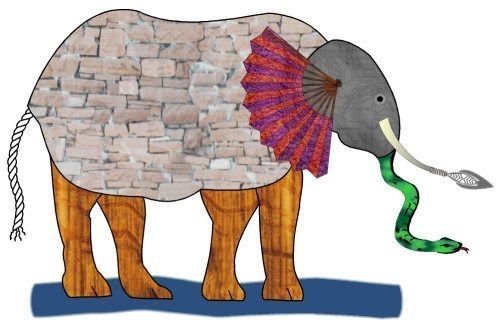Anekāntvād: The Ancient Wisdom of an Open Mind

Table of Contents
Do you know the story about the elephant and seven blind men? Each man stands next to a different part of the animal and is asked what he makes of it. The man touching the ear says it is a fan; the man by the tails thinks it's a rope; the man who stands at the tusks concludes it's a spear - and so on. They are all equally correct, and equally incorrect.
It is a very relatable conundrum for our current times. Algorithmically filtered social media and news only ever give us a narrow perspective of the information available - effectively putting blinders on our eyes. But it's not just access to information at stake. What we see of the world gives rise to our beliefs and stories, and intimately shapes our actions in the world.
This simple parable appears not only in ancient Jain teachings, but also Buddhist, Hindu, and Sufi ones, and has survived through the ages. Here's a poem from the 19th century written about this parable by John Godfrey Saxe, reminding us to remain humble about our opinions.
"And so these men of Indostan
Disputed loud and long,
Each in his own opinion
Exceeding stiff and strong,
Though each was partly in the right,
And all were in the wrong!"
The parable is often narrated to explain the powerful Jain philosophical concept of Anekāntvād - which translates to "not-one-sidedness", or simply "many-sidedness". It proposes that it's possible for more than one person to be correct, or at least partially correct. It makes truth a non-zero-sum game. Me being right doesn't make you wrong.
The word "An-ekānt-vād" is actually a compound of several Sanskrit words: An (negative prefix) + ekānta (a solitary place) + vād (school of thought). Piecing it back together again, we have a school of thought that reality is not a solitary place.
Historically this concept of Anekantvad was associated with a teaching of non-violence. Some scholars consider it an "intellectual non-violence". But, to me, it's more visceral than that. In conceding even a tiny margin to others, respecting the perspective of others, we stay connected. Keeping an open mind also keeps the heart open - it is a practice of compassion.
A wise friend of mine often says "Maybe you're right!" - with complete sincerity - in the middle of conversations. I asked him about this once, curious why he uses this particular phrase, and how it serves him. "It is like water that keeps things cool and flowing." He calls it one of his happiness principles.
The philosopher John Koller describes the basis of Anekantvad as being about seeing other people as identical to ourselves. Indeed, other beings are not “other” to themselves, they are themselves as much as we are ourselves, and this insight underlies our capacity for empathy and sympathy with others.
Mahatma Gandhi applied this philosophy in his life with the strength and purity that he brought to bear on all his beliefs. In several personal letters he explained how he can see the issue in many ways because: “I am an Anekantavadi”. In modern psychology terms we might say he had remarkable cognitive flexibility, to perceive reality in multiple ways. And using that term "flexibility" really helps me to see perception as a muscle which gets stiff if we don't use it.
Gandhi famously fought for the independence of India with a non-violent philosophy that gave space, respect and rights to a great diversity of people with different viewpoints. So much so, that when he was eventually murdered, his assasin's main qualm was that he gave too much ground to a minority religion in India, instead of promoting the dominant one. As Gandhi himself says below, he wanted to take everyone - the whole world - in the embrace of his love.
"I very much like this doctrine of the manyness of Reality. It is this doctrine that has taught me to judge a Musalman from his standpoint and a Christian from his. Formerly I used to resent the ignorance of my opponents. Today I can love them because I am gifted with the eye to see myself as others see me and vice versa. I want to take the whole world in the embrace of my love."
- Gandhi in Young India 21st Jan 1926, page 30
Just Looking Newsletter
Join the newsletter to receive the latest updates in your inbox.




